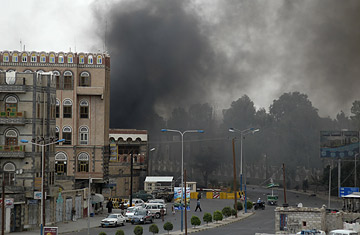
Smoke is seen billowing outside the U.S. embassy in Sanaa September 17, 2008.
The ancient Romans called Yemen Felix Arabia — Happy Arabia — for its advantageous spot on Middle Eastern spice routes. But modern day Yemen is anything but happy. Wednesday's attack on the U.S. embassy in Sanaa, Yemen's capital, is the latest sign of a growing al-Qaeda-inspired Islamic insurgency against the Washington-allied regime on the strategic southern tip of the Arabian peninsula.
The attack, which included an assault by heavily armed fighters and a car bomb, and left 16 people dead (including six of the attackers) is part of a long-standing pattern of incidents targeting the West and its allies, although no Americans were among Wednesday's dead. In 2000, al-Qaeda fighters rammed an explosives-packed speedboat into the U.S.S. Cole, killing 17 sailors and crippling the destroyer. A similar attack in 2002 against a French tanker sent 90,000 barrels of oil spilling into the Gulf of Aden.
Radical groups have taken advantage of Yemen's loosely knit tribal social structure to set up operational and recruiting bases in the country, according to terrorism experts. The country is awash in weapons, which are sold openly in urban markets known as gun souks. Its population of 22 million mired in poverty and illiteracy also provide a fertile recruiting ground for al-Qaeda. A French counter-terrorism official on a recent trip to Yemen was stunned to see the extent to which the country had become infiltrated by jihaddists.
Remote as it may seem, the collapse of security in Yemen poses a serious threat to stability in the Middle East and the Horn of Africa, and a challenge to U.S. efforts to fight al-Qaeda. The ancestral homeland of Osama bin Laden has been a major supplier of frontline fighters and suicide bombers deployed against America and its allies in Iraq and Somalia. The country also has a long border with Saudi Arabia, and sits on the eastern bank of the Bab al-Mandab, a narrow shipping channel that controls access to the Suez Canal.
Al-Qaeda operations in Yemen, in fact, are part of a long-term plan for the group to shift operations out of Iraq, according to Dr. Hasan Zaarour, a professor of Middle East and Africa Affairs at Lebanese University in Beirut. Yemen is a natural bridge into Africa, and its networks extend into the wider Middle East — the first al-Qaeda cell in Lebanon was started by a Yemeni. "Yemen has always exported terrorists through the Middle East," Zaarour says. "And they always introduce their presence with a big strike."
— With reporting by Bruce Crumley in Paris and Rami Aysha in Beirut
